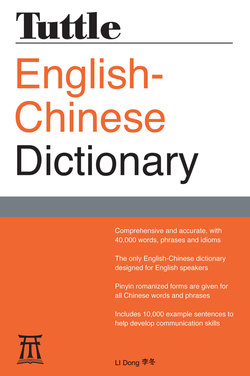Читать книгу Tuttle English-Chinese Dictionary - Li Dong - Страница 9
На сайте Литреса книга снята с продажи.
ОглавлениеList 2
Measure Words
Measure words are a special feature of Chinese. A particular measure word, or set of measure words, occurs with each noun whenever one is speaking of numbers. The measure word may function like a collective noun (like a pride [of lions] or a school [of fish]) or may be related to the shape of the object. Noun phrases using measure words often have the structure “number + measure word + noun,” e.g.
□ 一把刀 yì bǎ dāo a knife
□ 两道难题 liǎng dào nántí two difficult questions
Some measure words occur with verbs, and may be related to the frequency or duration of the action. For verbs, the expression may have the structure “verb + number + measure word,” e.g.
□ 看了三遍 kànle sān biàn read three times
□ 去过两次 qùguo liǎng cì have been ... twice
bǎ 把 for objects with handles; a handful
bān 班 class (in school)
bèi 倍 fold, time
běn 本 for books
bǐ 笔 for a sum of money
biàn 遍 times, indicating the frequency of an action done in its complete duration from the beginning to the end
cè 册 volume (books)
céng 层 story, floor
cháng 场 for rain, disasters
chǎng 场 for movies, sport events
chǐ 尺 a traditional Chinese unit of length (equal to ⅓ meter)
cì 次 time, expressing frequency of an act
cùn 寸 a traditional Chinese unit of length (equal to 1⁄30 meter)
dào 道 for questions in a school exercise, examination, etc.; for things in the shape of a line
dī 滴 drop (of liquid)
diǎn 点 o’clock
dù 度 degree (of temperature, longitude, latitude, etc.)
duàn 段 section of something long
dùn 顿 for meals
duǒ 朵 for flowers
fēn 分 Chinese currency (1 分 fēn = 0.1 角 jiǎo = 0.01 元 yuán), cent
fèn 份 for a set of things or newspapers, documents, etc.
fēng 封 for letters
fú 幅 for pictures, poster, maps, etc.
gè 个 the most commonly used measure word for nouns that do not take special measure words, or in default of any other measure word
gēn 根 for long, thin things
gōngchǐ 公尺 meter (formal)
gōngjīn 公斤 kilogram
gōnglǐ 公里 kilometer
háng 行 used with nouns that are formed in lines; line, row, queue
hù 户 used with nouns denoting households and families
huí 回 number of times
jiā 家 for families or businesses
jiān 间 for rooms
jiàn 件 for things, affairs, clothes or furniture
jiǎo 角 Chinese currency (0.1 yuán or 10 fēn), ten cents, a dime
jiē 节 a period of time
jīn 斤 a Chinese unit of weight equivalent to half a kilogram
jù 句 for sentences
kē 棵 for trees
kè 克 gram
kè 刻 quarter of an hour
kǒu 口 for members of a family
kuài 块 for things that can be broken into lumps or chunks; for money; yuan, dollar
lǐ 里 a Chinese unit of length, equivalent to 0.5 kilometer
lì 粒 for rice, pearls
liǎng 两 a traditional Chinese unit of weight, equivalent to 50 grams; ounce
liàng 辆 for vehicles
liè 列 for trains
máo 毛 a Chinese money unit, colloquialism for 角 jiǎo (= 0.1 元 yuán or 10 分 fēn)
mēn 门 for school subjects, languages, etc.
mǐ 米 meter (colloquial)
miàn 面 for flat objects
miǎo 秒 second (of time)
míng 名 for people, especially for those with a specific position or occupation
mǔ 亩 a traditional Chinese unit of area, especially in farming (equal to 1⁄15 hectare or 667 square meters)
pái 排 for things arranged in a row
pī 批 for a batch of goods, and for things/people arriving at the same time
pǐ 匹 for horses
piān 篇 for a piece of writing
piàn 片 for a thin and flat piece, slice
píng 瓶 a bottle of
qún 群 a crowd/group of
shēn 身 for clothes
shǒu 首 for songs and poems
shuāng 双 a pair of (shoes, chopsticks, etc.)
suì 岁 year (of age)
suǒ 所 for houses, or institutions housed in a building
tái 台 for machines, big instruments, etc.
tàng 趟 for trips
tào 套 a set of
tiáo 条 for things with a long, narrow shape
tóu 头 for cattle or sheep
wèi 位 a polite measure word for people
xià 下 used with certain verbs to indicate the number of times the action is done
xiàng 项 item, component
yè 页 for pages (of a book)
yīngchǐ 英尺 foot (as a measurement of length)
yīngcùn 英寸 inch
yuán 元 the basic unit of Chinese currency (1 元 yuán = 10 角 jiǎo/毛 máo = 100 分 fēn), dollar
zhāng 张 for paper, beds, tables, desks
zhèn 阵 for an action or event that lasts for some time
zhī 支 for stick-like things
zhī 只 for animals, utensils, or objects
zhǒng 种 kind, sort
zuò 座 for large and solid objects, such as a large building
